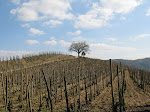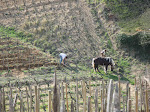
Reinhard Lowenstein, located in the lower Mosel town Winningen, is an extremely passionate winemaker who has attracted a cult following in Germany. In the US, however, his wines are virtually unknown. Some members of the American press have recently begun reviewing Lowenstein's wines, labeled Heymann-Lowenstein, but they remain off the radar of most German wine aficionados here. Mr. Lowenstein is obsessed with the notion of terroir and he bottles his cuvees according to the type of soil they originate from. As a winemaker, Lowenstein emphasizes minimal intervention. The 2005 Heymann-Lowenstein, Riesling, Schieferterrassen showed a deep yellow color and a nose infused with petrol. While not uncommon in older bottles, it is unusual to find petrol aromas in a young riesling. It appears that Lowenstein exposes his wines to a good amount of oxygen during the elevage which might explain the advanced nature of the wine's color and aroma. In the mouth, the wine was medium bodied, dry and lively. Schieferterrasen is the estate's basic bottling and is a blend of several vineyards consisting of various soil types.
The one aspect that separates the dry wines made by Lowenstein from those of other growers in Germany is their beautiful texture. Most of the trocken style wines that I have tasted seem coarse, hard and overly intense. In contrast, Lowenstein's wines caress the palate and appear to be almost weightless. While drinking the Schieferterrasen, it occurred to me that this style of wine might be a flash back to what good German Riesling tasted like prior to the invention of the Pradikat classification system (i.e. Kabinett, Spatlese, etc.). Before the growers began haulting the fermentation and intentionally leaving sugar in the wines, I suspect that most were dry/off dry. The best wines of Germany were highly sought after in England in the 18th and 19th centuries, but from what I have read, they were considered dry table wines. The Mosel region is cold, and it is probable that in some of the past vintages not all the sugar would have converted to alcohol. These cooler vintages would have resulted in wines with some perceivable sweetness, but they were most likely drier and fuller bodied those made today. The estate of Reinhard Lowenstein may seem like a new exciting discovery, but his wines might have felt right at home a century ago.










No comments:
Post a Comment